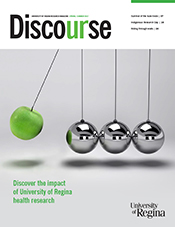
To say this past year has tested the limits of human resiliency would be an understatement. The global pandemic has exposed our vulnerabilities around social isolation, and our need for community and connection has been brought to the forefront.
While some have been able to safely visit with loved ones, that’s not been the case for everyone—especially Saskatchewan’s older adults, who tend to be far more isolated than others because of their elevated risk from COVID-19.
To help foster meaningful connections, University of Regina researchers launched Studio Without Walls, an art-based project delivered to older adults over the phone.

“We initially planned to engage with older adults in person, but the pandemic changed everything,” says Dr. Amber Fletcher, associate professor of sociology. “It was Barbara who suggested that we try to offer this programming over the phone instead.”
Dr. Barbara Menely is a postdoctoral researcher working with Fletcher.
As soon as that light bulb went off, the two pulled their team together and went to work. They discovered several organizations already using the phone model—including the Seniors’ Centre Without Walls Saskatchewan, which has now partnered with them on this project. They also connected with an organization in British Columbia that offers phone programs for seniors.
Giving older adults a creative outlet from their homes is something Fletcher believes is even more relevant now.
“Almost everyone has a phone,” says Fletcher. “And something phone-based is particularly suited to older adults who may not be familiar with social media or online technology.”
Plus, she adds, internet access isn’t guaranteed, especially in Saskatchewan’s rural areas.
“In some cases, the social isolation for older adults living outside urban centres is even greater, so we wanted to ensure they were a big part of our program,” says Fletcher.
Six artists are each teaching a different workshop through painting, writing, and other visual arts. Over 60 people are participating in the various workshops right now.

“The age of participants and artistic skill level varies,” says Shon Profit, the Saskatchewan-based visual artist who led the first workshop. “It’s interesting because what typically prevents people from doing art is their belief that they aren’t creative, so group environments can deter them from doing it.”
The telephone workshops remove the fear some participants experience in a group setting - that they won’t be as good as those around them. However, that's forced Profit to adjust how she delivers her workshops.
“I had to rethink how I would explain and deliver everything,” says Profit. “It took me so long to think through how to say what I needed to say using photographs and minimal words.”
For each workshop, the supplies are delivered directly to each participant’s door with a one-page explanation of the art project, making it easy for participants to take part.
Studio Without Walls is part of a larger research project that’s been in the works for a few years now.
“We've been working in partnership with the Saskatchewan Arts Alliance for two or three years,” says Meneley. “And the bigger research question is about learning the value that the arts hold in people's lives and communities.”
The team effort has been extraordinary. The Saskatchewan Seniors Association contributed funding and distributed flyers in communities. The group also received funding from Mitacs and the Social Sciences and Humanities Research Council.

“The support from our partners allows us to do this research,” says Meneley. “It helps us connect with communities and fund our fieldwork activities, including costs associated with providing the artists and materials.”
With the workshops slated to wrap up in June, Fletcher and Meneley hope this concept will extend beyond that time frame. The project is already creating buzz far and wide, with people reaching out to them from across North America wanting to do something similar.
While the workshops are still underway, Fletcher says the feedback coming in from the participants so far has been overwhelmingly positive.
"I find that for myself, I get immersed in the experience, and the hour is gone in a snap of the finger,” says one participant.
Another says that Studio Without Walls "has been like walking through the threshold of a door into an entirely new experience.”
During such a difficult time as the COVID-19 pandemic, when new experiences can be few and far between, Studio Without Walls is improving community connections and helping to alleviate social isolation for older adults when they need it most.

















